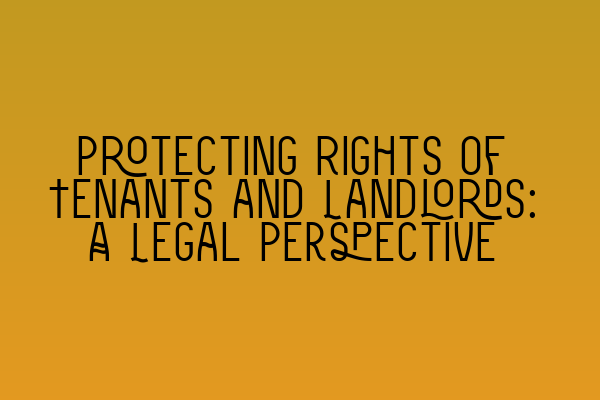Protecting Rights of Tenants and Landlords: A Legal Perspective
As the legal landscape surrounding property law continues to evolve, it is essential for both tenants and landlords to understand their rights and obligations. Renting a property can be a complex process, and it’s crucial to have a solid understanding of the legal framework in order to protect your interests and avoid potential disputes. In this blog post, we will delve into the key legal considerations for tenants and landlords, providing valuable insights from our team of experts at SQE Property Law & Land Law.
Tenants’ Rights and Responsibilities
Tenants play a vital role in the rental market, and it’s important for them to be aware of their rights. One of the fundamental rights of tenants is the right to live in a safe and habitable property. Landlords are obligated to ensure that the property meets the necessary health and safety standards, including proper maintenance of electrical, gas, and fire safety systems. If these obligations are not met, tenants have the right to take legal action to ensure their safety.
In addition to a safe living environment, tenants also have the right to privacy. Landlords must respect their tenants’ privacy and cannot enter the property without proper notice, except in cases of emergency. It’s crucial for tenants to familiarize themselves with the terms of their tenancy agreement to understand their privacy rights.
Furthermore, tenants have the right to live in a property that is free from discrimination. Landlords cannot discriminate against tenants based on their race, religion, gender, disability, or any other protected characteristic. If tenants believe they have been subjected to discrimination, they can seek legal recourse.
While tenants have certain rights, they also have responsibilities. They must pay their rent on time and take care of the property, ensuring it is returned in good condition at the end of the tenancy. Tenants should also familiarize themselves with the terms of their tenancy agreement, as it outlines their obligations and the consequences of breaching them.
For more information on understanding the legal framework of property law, check out our article on 39. Skills Assessed in SQE: Understanding the Exam Content.
Landlords’ Rights and Obligations
Landlords have the right to rent out their property and receive rent payments from tenants. However, they also have several legal obligations that they must fulfill. One of the primary responsibilities of landlords is to provide a safe and habitable property for their tenants. This includes timely repairs of any structural issues, ensuring the property is free from hazards, and maintaining essential utilities.
Landlords also have the right to receive their rent on time and can take legal action if tenants fail to pay. However, it’s important for landlords to follow the correct legal procedures when pursuing arrears or seeking to evict a tenant, as improper actions can lead to legal consequences.
Moreover, landlords have the right to protect their property from damage caused by tenants. They can include clauses in the tenancy agreement that outline the tenant’s responsibilities for maintaining the property, such as regular cleaning and reporting any damage. Landlords can also request a security deposit from tenants to cover any potential damages, as long as it adheres to the legal requirements.
For a comprehensive guide to mastering the assessment process and improving your skills as a landlord, read our article on 40. Interviewing in SQE: Mastering the Assessment Process.
Resolving Disputes
Despite the best efforts of both tenants and landlords, disputes may still arise during a tenancy. When faced with a dispute, it’s important to seek legal advice to understand your rights and options for resolution.
The first step in resolving a dispute is to try to communicate and negotiate with the other party. In many cases, a resolution can be reached through open dialogue and compromise. However, if informal negotiations fail, it may be necessary to consider alternative dispute resolution methods, such as mediation or arbitration.
If all else fails, legal action may be required to resolve the dispute. It is crucial to hire an experienced property law solicitor who can guide you through the legal process, ensuring that your rights are protected and advocating for your interests in court.
To learn more about balancing work and preparation for the SQE exam while navigating property law issues, refer to our article on 22. Balancing Work and SQE Prep: Strategies for Success.
Conclusion
Protecting the rights of tenants and landlords is of utmost importance in today’s rental market. By understanding the legal framework and seeking professional advice when needed, both parties can create a fair and mutually beneficial tenancy. If you require legal assistance or expert advice regarding property law, please contact our team at SQE Property Law & Land Law.
For secrets on how to pass the SQE exam and understand the grading system, uncover the valuable insights in our articles on 24. Unlocking the Secrets to Passing the SQE Exam and 23. Understanding the Grading System in SQE.
